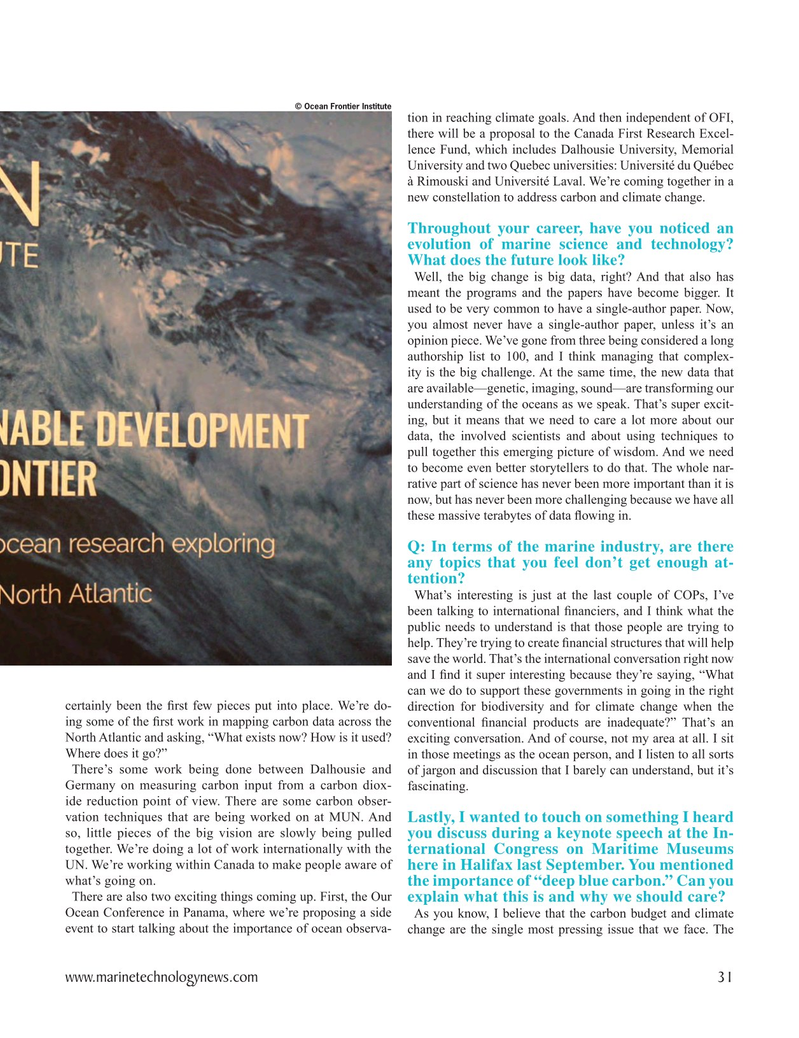
Page 31: of Marine Technology Magazine (March 2023)
Read this page in Pdf, Flash or Html5 edition of March 2023 Marine Technology Magazine
© Ocean Frontier Institute tion in reaching climate goals. And then independent of OFI, there will be a proposal to the Canada First Research Excel- lence Fund, which includes Dalhousie University, Memorial
University and two Quebec universities: Université du Québec à Rimouski and Université Laval. We’re coming together in a new constellation to address carbon and climate change.
Throughout your career, have you noticed an evolution of marine science and technology?
What does the future look like?
Well, the big change is big data, right? And that also has meant the programs and the papers have become bigger. It used to be very common to have a single-author paper. Now, you almost never have a single-author paper, unless it’s an opinion piece. We’ve gone from three being considered a long authorship list to 100, and I think managing that complex- ity is the big challenge. At the same time, the new data that are available—genetic, imaging, sound—are transforming our understanding of the oceans as we speak. That’s super excit- ing, but it means that we need to care a lot more about our data, the involved scientists and about using techniques to pull together this emerging picture of wisdom. And we need to become even better storytellers to do that. The whole nar- rative part of science has never been more important than it is now, but has never been more challenging because we have all these massive terabytes of data ? owing in.
Q: In terms of the marine industry, are there any topics that you feel don’t get enough at- tention?
What’s interesting is just at the last couple of COPs, I’ve been talking to international ? nanciers, and I think what the public needs to understand is that those people are trying to help. They’re trying to create ? nancial structures that will help save the world. That’s the international conversation right now and I ? nd it super interesting because they’re saying, “What can we do to support these governments in going in the right certainly been the ? rst few pieces put into place. We’re do- direction for biodiversity and for climate change when the ing some of the ? rst work in mapping carbon data across the conventional ? nancial products are inadequate?” That’s an
North Atlantic and asking, “What exists now? How is it used? exciting conversation. And of course, not my area at all. I sit
Where does it go?” in those meetings as the ocean person, and I listen to all sorts
There’s some work being done between Dalhousie and of jargon and discussion that I barely can understand, but it’s
Germany on measuring carbon input from a carbon diox- fascinating.
ide reduction point of view. There are some carbon obser- vation techniques that are being worked on at MUN. And
Lastly, I wanted to touch on something I heard so, little pieces of the big vision are slowly being pulled you discuss during a keynote speech at the In- together. We’re doing a lot of work internationally with the ternational Congress on Maritime Museums
UN. We’re working within Canada to make people aware of here in Halifax last September. You mentioned what’s going on. the importance of “deep blue carbon.” Can you
There are also two exciting things coming up. First, the Our explain what this is and why we should care?
Ocean Conference in Panama, where we’re proposing a side As you know, I believe that the carbon budget and climate event to start talking about the importance of ocean observa- change are the single most pressing issue that we face. The www.marinetechnologynews.com 31
MTR #3 (18-33).indd 31 3/17/2023 6:04:11 PM

 30
30

 32
32
